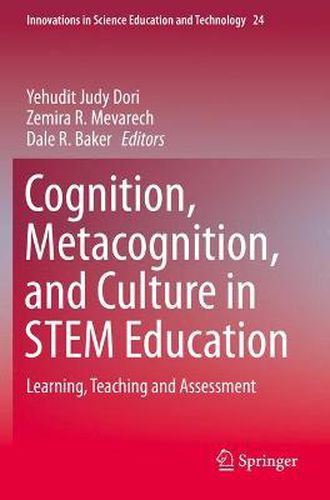Readings Newsletter
Become a Readings Member to make your shopping experience even easier.
Sign in or sign up for free!
You’re not far away from qualifying for FREE standard shipping within Australia
You’ve qualified for FREE standard shipping within Australia
The cart is loading…






This title is printed to order. This book may have been self-published. If so, we cannot guarantee the quality of the content. In the main most books will have gone through the editing process however some may not. We therefore suggest that you be aware of this before ordering this book. If in doubt check either the author or publisher’s details as we are unable to accept any returns unless they are faulty. Please contact us if you have any questions.
This book addresses the point of intersection between cognition, metacognition, and culture in learning and teaching Science, Technology, Engineering, and Mathematics (STEM). We explore theoretical background and cutting-edge research about how various forms of cognitive and metacognitive instruction may enhance learning and thinking in STEM classrooms from K-12 to university and in different cultures and countries.
Over the past several years, STEM education research has witnessed rapid growth, attracting considerable interest among scholars and educators. The book provides an updated collection of studies about cognition, metacognition and culture in the four STEM domains. The field of research, cognition and metacognition in STEM education still suffers from ambiguity in meanings of key concepts that various researchers use. This book is organized according to a unique manner: Each chapter features one of the four STEM domains and one of the three themes-cognition, metacognition, and culture-and defines key concepts. This matrix-type organization opens a new path to knowledge in STEM education and facilitates its understanding. The discussion at the end of the book integrates these definitions for analyzing and mapping the STEM education research.
Chapter 4 is available open access under a Creative Commons Attribution 4.0 International License via link.springer.com
$9.00 standard shipping within Australia
FREE standard shipping within Australia for orders over $100.00
Express & International shipping calculated at checkout
This title is printed to order. This book may have been self-published. If so, we cannot guarantee the quality of the content. In the main most books will have gone through the editing process however some may not. We therefore suggest that you be aware of this before ordering this book. If in doubt check either the author or publisher’s details as we are unable to accept any returns unless they are faulty. Please contact us if you have any questions.
This book addresses the point of intersection between cognition, metacognition, and culture in learning and teaching Science, Technology, Engineering, and Mathematics (STEM). We explore theoretical background and cutting-edge research about how various forms of cognitive and metacognitive instruction may enhance learning and thinking in STEM classrooms from K-12 to university and in different cultures and countries.
Over the past several years, STEM education research has witnessed rapid growth, attracting considerable interest among scholars and educators. The book provides an updated collection of studies about cognition, metacognition and culture in the four STEM domains. The field of research, cognition and metacognition in STEM education still suffers from ambiguity in meanings of key concepts that various researchers use. This book is organized according to a unique manner: Each chapter features one of the four STEM domains and one of the three themes-cognition, metacognition, and culture-and defines key concepts. This matrix-type organization opens a new path to knowledge in STEM education and facilitates its understanding. The discussion at the end of the book integrates these definitions for analyzing and mapping the STEM education research.
Chapter 4 is available open access under a Creative Commons Attribution 4.0 International License via link.springer.com